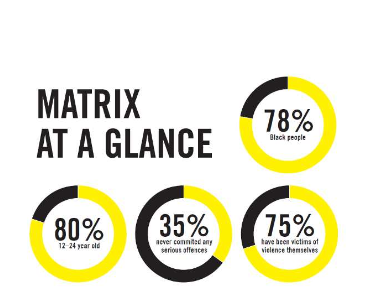More than a thousand people have been removed from the Metropolitan Police’s controversial gang database, the Mayor of London has announced. The human rights campaign group Liberty described the cull of the Matrix database as ‘a big win‘ but call for it to be ‘scrapped entirely’.
The Matrix database was established in response to the August 2011 riots which followed the shooting of Mark Duggan in Tottenham and the ensuing riots that spread from London to several other English cities over five days. Only 13% of those arrested in the riots had any gang connection, according to the Ministry of Justice and Home Office analysis as reported in the Guardian. Nonetheless, politicians made much of a supposed gang connection with, for example, the then minister Iain Duncan Smith claiming that gangs ‘played a significant part’ in the riots, with then-Home Secretary Theresa May echoing this link. The Mayor of London, then Boris Johnson, conflated the riots with gangs, and stated that ‘this is an opportunity to deal with gang crime’.
Sadiq Khan, the Mayor of London, has now said that Black Londoners have ‘less trust in the Met [and that] should concern us all’. The Met’s Commissioner, Sir Mark Rowley acknowledged that the database ‘needs to be redesigned’ and 1,200 low-risk individuals have been removed.
At its peak, in August 2017, the details of nearly 4,000 individuals were logged on the database. However, critics have complained that it racist, ineffective and unsafe (as reported on the Justice Gap here). The names of individuals can be added on spurious of grounds and, for example, previous convictions and known associations with friends and family are common justifications but even watching music videos can lead to someone’s inclusion. Children as young as 12 have been added to the list.
Amnesty International issued a report in 2020, noting that, whilst black people were responsible for 27% of serious youth crime, 78% of people on the database were black. The law reform group JUSTICE highlightedone occasion where 99% of a particular borough’s list was black ‘despite the largest so-called gang in the borough being the Green Lane Turks’.
Inclusion on the database can have dire consequences. The issuing of eviction notices to those on the database is ‘a routine tactic’, according to one housing officer. In other cases, schools are contacted and ‘warned’ that a child is a ‘gang nominal’, an approach which JUSTICE claims ‘serves to marginalise and criminalise BAME people, particularly those at a young age… [making] the pull of gangs stronger’.
In 2018, the Met was served with an enforcement notice from the Information Commissioner for ‘blanket and undifferentiated sharing of sensitive personal data’ and noted that the data which is stored and shared ‘cannot be said to be accurate’. The watchdog noted Matrix ‘does not accurately or fairly note‘ whether an individual has been added on the basis of their ‘victim status’ and individuals had no way of discovering whether they were on the list or of reviewing the accuracy of their data. Liberty is currently pursuing legal action against the Met, arguing that it breaches human rights and data protection laws.







